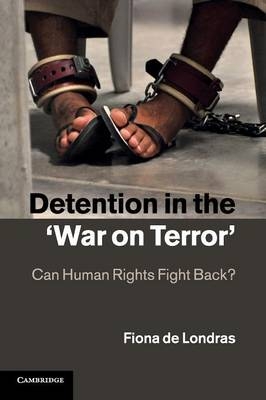
Detention in the 'War on Terror'
Can Human Rights Fight Back?
Seiten
2015
Cambridge University Press (Verlag)
978-1-107-53815-3 (ISBN)
Cambridge University Press (Verlag)
978-1-107-53815-3 (ISBN)
This book outlines the US and UK's counter-terrorist detention policies and the reactions thereto by international human rights institutions and domestic apex courts. It presents an argument of interest to lawyers and political scientists that international human rights law may be more resilient to counter-terrorist panic than domestic law.
In this book, Fiona de Londras presents an overview of counter-terrorist detention in the US and the UK and the attempts by both states to achieve a downward recalibration of international human rights standards as they apply in an emergency. Arguing that the design and implementation of this policy has been greatly influenced by both popular and manufactured panic, Detention in the 'War on Terror' addresses counter-terrorist detention through an original analytic framework. In contrast to domestic law in the US and UK, de Londras argues that international human rights law has generally resisted the challenge to the right to be free from arbitrary detention, largely because of its relative insulation from counter-terrorist panic. She argues that this resilience gradually emboldened superior courts in the US and UK to resist repressive detention laws and policies and insist upon greater rights-protection for suspected terrorists.
In this book, Fiona de Londras presents an overview of counter-terrorist detention in the US and the UK and the attempts by both states to achieve a downward recalibration of international human rights standards as they apply in an emergency. Arguing that the design and implementation of this policy has been greatly influenced by both popular and manufactured panic, Detention in the 'War on Terror' addresses counter-terrorist detention through an original analytic framework. In contrast to domestic law in the US and UK, de Londras argues that international human rights law has generally resisted the challenge to the right to be free from arbitrary detention, largely because of its relative insulation from counter-terrorist panic. She argues that this resilience gradually emboldened superior courts in the US and UK to resist repressive detention laws and policies and insist upon greater rights-protection for suspected terrorists.
Fiona de Londras is a lecturer at University College Dublin School of Law where she specialises in terrorism, human rights and constitutionalism.
Introduction; 1. Panic, fear and counter-terrorist law-making; 2. The right to be free from arbitrary detention; 3. Counter-terrorist detention: the executive approach; 4. Legislating for counter-terrorist detention; 5. International human rights law's resilience in the face of panic; 6. Judicial responses to counter-terrorist detention: rights-based resistance?; 7. Conclusion.
| Zusatzinfo | Worked examples or Exercises |
|---|---|
| Verlagsort | Cambridge |
| Sprache | englisch |
| Maße | 151 x 229 mm |
| Gewicht | 600 g |
| Themenwelt | Recht / Steuern ► EU / Internationales Recht |
| Recht / Steuern ► Öffentliches Recht ► Völkerrecht | |
| Sozialwissenschaften ► Politik / Verwaltung ► Europäische / Internationale Politik | |
| ISBN-10 | 1-107-53815-7 / 1107538157 |
| ISBN-13 | 978-1-107-53815-3 / 9781107538153 |
| Zustand | Neuware |
| Haben Sie eine Frage zum Produkt? |
Mehr entdecken
aus dem Bereich
aus dem Bereich


